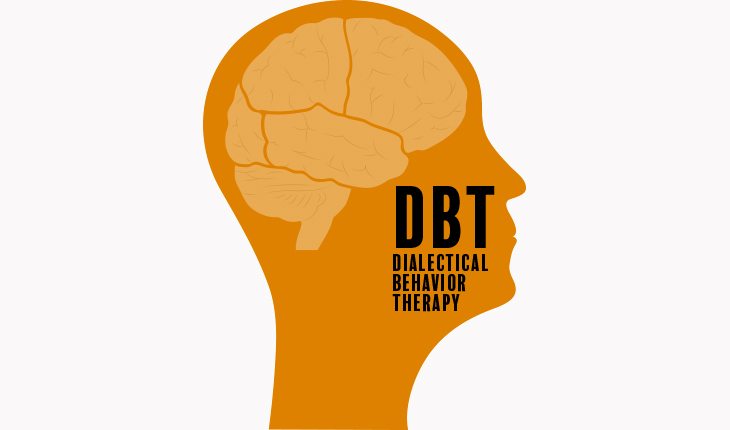Dialectical behavior therapy, or DBT, is a type of cognitive-behavioral therapy. It was first developed in the early 1990s by Marsha Linehan. It is one of the most effective treatments for borderline personality disorder. And has been shown to be helpful for other conditions as well. In this blog post, we will discuss what dialectical behavior therapy is, and how it can help you or someone you love!
Contents
- 1 What Is Dialectical Behavior Therapy?
- 2 What Techniques Are Used In Dialectical Behavior Therapy (DBT)?
- 3 What Other Illnesses Can Be Treated With Dialectical Behavior Therapy?
- 4 Benefits Of Dialectical Behavior Therapy?
- 5 How It Helps People With Mental Disorders?
- 6 Where To Start?
- 7 Concluding Thoughts
- 8 A Word From Therapy Mantra
What Is Dialectical Behavior Therapy?
 Dialectical behavior therapy (DBT) is a type of cognitive-behavioral therapy. Marsha Linehan has first developed this therapy in the early 1990s. Specifically, it was designed to help people who have difficulty regulating their emotions and behaviors.
Dialectical behavior therapy (DBT) is a type of cognitive-behavioral therapy. Marsha Linehan has first developed this therapy in the early 1990s. Specifically, it was designed to help people who have difficulty regulating their emotions and behaviors.
A borderline personality disorder is a specific mental disorder treatable with this therapy. Over time, it has been found to be helpful for a variety of other mental health conditions. Dialectical behavior therapy is also being used for those who are in recovery from addiction.
This therapy is also called “Linehan therapy.” And, it is often abbreviated as “DBT.” The therapy is widely used to treat PTSD, addiction, eating disorders, BPD, and other mental health conditions.
What Techniques Are Used In Dialectical Behavior Therapy (DBT)?
There are various techniques used in dialectical behavior therapy. Also, there are some settings that are used in the therapy, such as;
- Group therapy – It is the way to provide support for people with a borderline personality disorder. Group therapy is also a way to improve communication and problem-solving skills.
- Individual therapy – This type of therapy helps people learn how to control their emotions, solve problems, and communicate effectively.
- Skills training – It focuses on teaching four main skills: emotion regulation, mindfulness, interpersonal effectiveness, and distress tolerance.
- Therapy homework – People are asked to do exercises outside of the sessions in order to practice the new skills they have learned in DBT.
- Phone coaching – This is a way to provide support for people who are not able to attend group or individual therapy sessions.
In these settings, a therapist will use different techniques to help a person with mental illness. Such techniques are;
Validation
The therapist will try to understand how the person is feeling and show that they understand. In this, the therapist will not judge the person for their feelings. Also, validation in dialectical behavior therapy helps the person not feel like they are bad or wrong.
For example, a person with a borderline personality disorder may feel like they are bad because they get angry easily. The therapist will try to understand why the person is feeling this way and then work on helping the person change their thinking.
Cognitive restructuring
 Cognitive restructuring is a technique that helps people change the way they think about themselves and the world around them. The therapist will help the person identify negative thoughts and replace them with more positive thoughts.
Cognitive restructuring is a technique that helps people change the way they think about themselves and the world around them. The therapist will help the person identify negative thoughts and replace them with more positive thoughts.
In cognitive restructuring, the therapist will also help the person challenge their thoughts. This means looking at evidence for and against their thoughts.
For example, a person with a borderline personality disorder may think that they are ugly and no one will ever want to be with them. The therapist will help the person question this thought by asking them to list reasons why they might be attractive to someone.
Interpersonal effectiveness
The therapist will help the person learn how to communicate effectively with others. Interpersonal is often difficult for people with some mental illnesses. Because they may have trouble controlling their emotions.
The therapist will help the person understand their emotions and how to express them in a way that is respectful to others. The therapist will also help the person learn how to ask for what they want, set boundaries, and deal with conflict.
For example, expressing your needs to a therapist may be difficult. In this case, the therapist will help you to build your courage. And give you tools on how to do it in a more effective way.
Core Mindfulness
Core mindfulness is the best-considered benefit of dialectical behavior therapy. It helps people to focus on the present moment. And it allows them to accept their thoughts and feelings without judgment.
In DBT, mindfulness is taught in a way that is easy for people to understand. The therapist will help the person learn how to be more aware of their body, thoughts, and emotions. And they will also teach the person how to stay in the present moment.
Distress tolerance
This skill focuses on helping people manage difficult emotions. The therapist will help the person learn how to tolerate uncomfortable feelings without harming themselves or others.
For example, a person with a borderline personality disorder may feel like they need to self-harm in order to cope with their emotions. The therapist will help the person learn other ways to cope with their emotions. Such as using relaxation techniques or positive self-talk.
What Other Illnesses Can Be Treated With Dialectical Behavior Therapy?
 Though DBT is generally used to treat Borderline Personality Disorder, it can be used to help with other illnesses as well. So, dialectical behavior therapy has been found to be effective in treating:
Though DBT is generally used to treat Borderline Personality Disorder, it can be used to help with other illnesses as well. So, dialectical behavior therapy has been found to be effective in treating:
- Attention deficit hyperactivity disorder (ADHD)
- Mood disorders, such as major depressive disorder and bipolar disorder
- Eating disorders, such as anorexia nervosa and bulimia nervosa
- Self-harm behaviors, such as cutting and burning oneself
- Suicidal thoughts and behaviors
- Problematic alcohol and drug use
- Nicotine dependence
- Major life stressors, such as a death in the family, a divorce, or losing a job
DBT can also be helpful for people who don’t have any of these diagnoses. It can help people who are simply struggling in life, feeling overwhelmed and like they can’t cope. So if you’re feeling this way, DBT may be a good option for you.
In fact, dialectical behavior therapy is one of the most researched and evidence-based therapies out there. So you can be confident that it will help you if you decide to try it.
Benefits Of Dialectical Behavior Therapy?
Dialectical behavior therapy, or DBT, is a type of cognitive-behavioral therapy. That can be extremely helpful for people with borderline personality disorder and other emotion regulation disorders.
Such benefits associated with it are;
- Acceptance and change – Through this, you will learn strategies to accept yourself while also making necessary changes. And, you will be more able to develop skills that can help you regulate your emotions.
- Improved communication – This therapy can help people communicate better with others, both verbally and nonverbally. As a result, they may have healthier and more fulfilling relationships.
- Enhanced self-esteem – People in DBT often report an increase in their self-esteem after completing the program. This is likely due to the combination of accepting themselves while also working on change.”
- Increased mindfulness – You will learn how to be more present in the moment and focused on your own thoughts and feelings. This can help you manage difficult emotions more effectively.
- Help you manage difficult emotions – Difficult emotions like anger, sadness, and anxiety can be overwhelming. DBT can help you understand these emotions and how to cope with them.
By practicing dialectical behavior therapy, an individual’s action changes by reducing negative emotions and increasing positive reinforcement. It helps people to have a better life as they learn how to control their emotional responses and develop skills that work for them. Each therapeutic setting has its own goals and structure to enhance its effectiveness.
How It Helps People With Mental Disorders?
 This therapy is proven to help in various kinds of mental disorders. Such as bipolar disorder, borderline personality disorder, and suicidal thoughts.
This therapy is proven to help in various kinds of mental disorders. Such as bipolar disorder, borderline personality disorder, and suicidal thoughts.
- People with BPD – Studies have shown that DBT can be very helpful for people with a borderline personality disorder. It can help reduce self-harm, suicidal thoughts, and improve moods. According to one study, more than 75% of people who completed DBT showed significant improvements in their symptoms.
- People with bipolar disorder – DBT has been shown to be helpful for people with bipolar disorder. It can help reduce symptoms such as mania and depression. And it may also help prevent relapse. In fact, one study found that DBT may be more effective than medication at helping people with bipolar disorder stay well.
- People with suicidal thoughts – DBT has been shown to be very helpful for people who are struggling with suicidal thoughts. It can help reduce the risk of suicide and improve moods. In fact, one study found that DBT may be more effective than antidepressant medications at reducing the risk of suicide.
- DBT for other conditions – There have been studies in the field of DBT for other conditions such as eating disorders, self-injury, and PTSD. The results have been positive so far.
So, it is overall very beneficial for people who are struggling with different mental health disorders. It can help improve moods, reduce self-harm and suicidal thoughts, and prevent relapse. If you are struggling with a mental disorder, it is worth considering DBT as a treatment option.
Where To Start?
 Dialectical Behavior Therapy (DBT) is a specific type of cognitive-behavioral therapy. However, people seem to confuse that about where to start.
Dialectical Behavior Therapy (DBT) is a specific type of cognitive-behavioral therapy. However, people seem to confuse that about where to start.
Here are some of the tips;
- Check with your insurance company. DBT is often covered by insurance plans.
- Look for a therapist who specializes in DBT. Not all therapists know how to do DBT, so it’s important to find one who does.
- Attend a group orientation session. This will give you an idea of what the program is like and whether it’s the right fit for you.
- Be honest with your therapist. DBT is based on the idea of honesty and self-awareness. If you’re not willing, to be honest with your therapist, then DBT may not be the right fit for you.
- Start slowly. Don’t try to do everything all at once. Start with one skill or behavior and work on it until it becomes a habit.
There is no wrong way to do DBT. Everyone progresses at their own pace and everyone experiences therapy differently. So, if something doesn’t work for you, talk to your therapist about it. They can help you find a different way to approach the therapy that works better for you.
DBT can be life-changing for people who struggle with their emotions. But, it’s important to remember that it takes time and effort to see results. So, be patient and keep working on your skills. You’ll see progress if you do.
That’s a good starting point! If you have any other questions, don’t hesitate to reach out to the internet. One of the best things about DBT is the community of supportive people.
Concluding Thoughts
Conclusively, dialectical behavior therapy is a powerful tool that can help you manage your emotions and improve your relationships. It may be the perfect treatment for you if you are struggling with Borderline Personality Disorder or other emotional regulation issues.
To know more about dialectical behavior therapy, don’t hesitate to reach out to a mental health professional in your area. They can help you determine if this type of therapy is right for you. Professionals can guide you better in order to achieve your goal.
A Word From Therapy Mantra
Your mental health — Your psychological, emotional, and social well-being — has an impact on every aspect of your life. Positive mental health essentially allows you to effectively deal with life’s everyday challenges.
At TherapyMantra, we have a team of therapists who provide affordable online therapy to assist you with issues such as depression, anxiety, stress, workplace Issues, addiction, relationship, OCD, LGBTQ, and PTSD. You can book a free therapy or download our free Android or iOS app.


